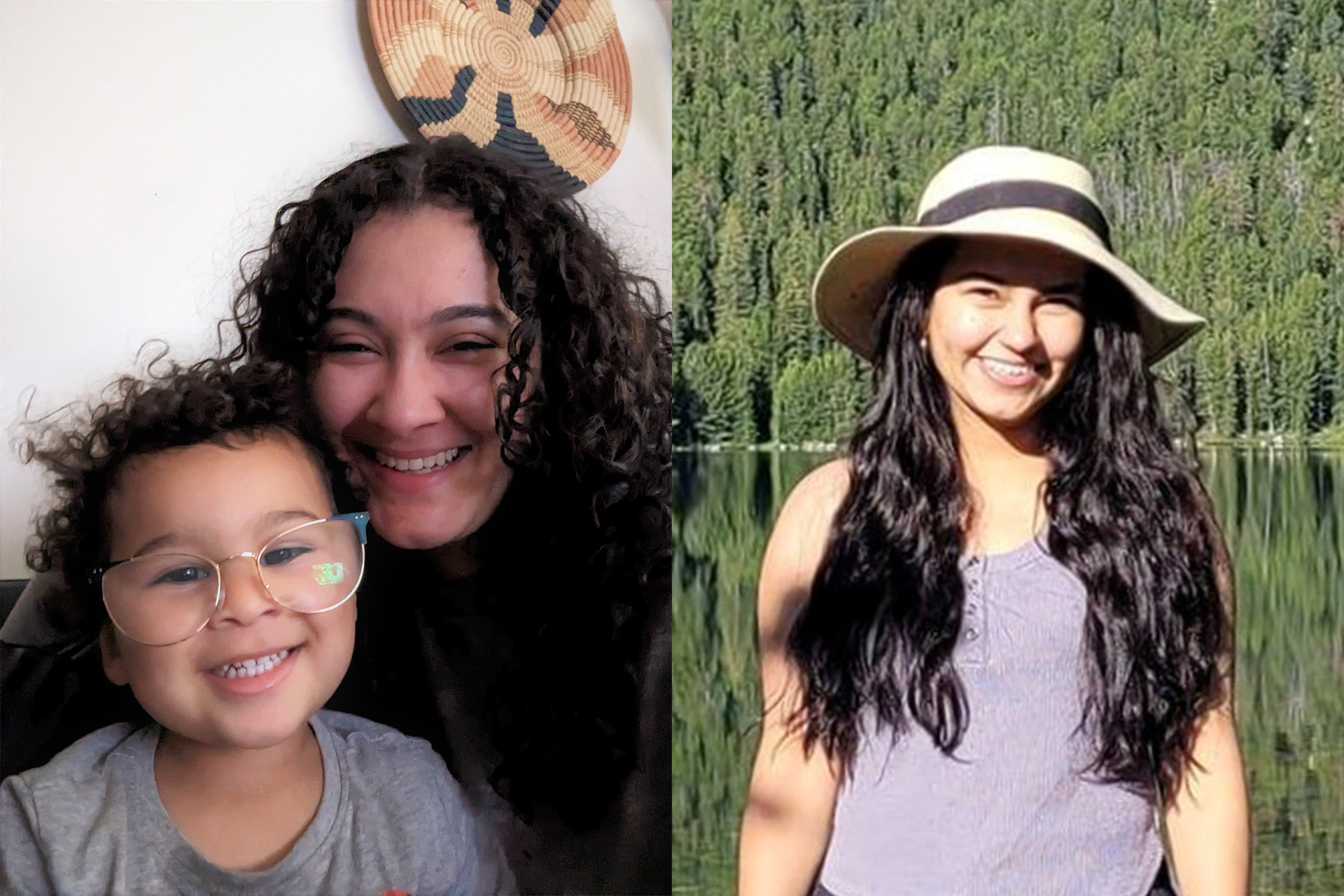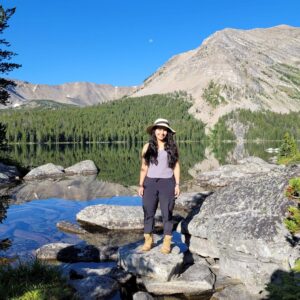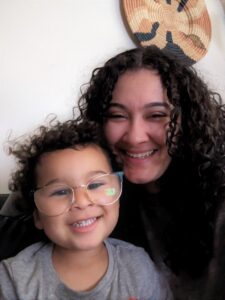
Micaela Sabbi (left) and Ashlesha Khatiwada are among the first Inclusive Excellence Fellowship recipients.

Colorado State University’s Graduate School awarded its first Inclusive Excellence Fellowships to three outstanding, incoming graduate students who have demonstrated exceptional academic achievement, leadership and a commitment to promoting diversity, equity and inclusion in higher education.
“The creation of this fellowship supports the recruitment of exceptional graduate students who share the university’s goals of inclusive excellence,” said Colleen Webb, dean of the Graduate School. “This program is not only an investment in the future of our graduate students but also in the future of our society as a whole. By fostering a diverse and inclusive community of scholars, we can better address the complex challenges facing our world.”
To promote inclusive excellence in all areas of CSU, the Graduate School evaluated the prospective programs’ commitment to support inclusive excellence. This fall, the Department of Geosciences, the Department of Economics, and the Department of Biology will welcome the Inclusive Excellence Fellows.
Ashlesha Khatiwada, Department of Geosciences, faculty advisor: Dan McGrath

Ashlesha Khatiwada was completing her high school IB degree in Kathmandu, Nepal at the time of the Gorkha Earthquake in 2015. The earthquake killed about 9,000 individuals and injured over 20,000. Immediately following the earthquake, Khatiwada worked with a local nonprofit organization to distribute tents, clothes, food and other basic necessities to rural Nepali communities. This experience motivates her graduate studies; she wants to improve her understanding of earth science and give back to society.
“Coming from Nepal, I didn’t see myself as a graduate student, but I had a really good support system,” said Khatiwada.
Khatiwada recently completed a master’s degree at the Department of Geosciences at the University of Montana. The University of Montana Global Engagement Office recognized Khatiwada with the Distinguished Service and Cultural Ambassador Award for exemplary service in promoting cross-cultural understanding and goodwill via leadership.
As a master’s student, she participated as a mentor in the Undergraduate Mentoring Program, volunteered for the Rotaract Club of Montana effort to provide clean water infrastructure to Guatemalan villages, and mentored new international students.
“When I do volunteer at the Global Engagement Office for International students or for Rotaract, it makes me feel like I’m not just in my own bubble,” said Khatiwada. “I’m still getting out there and having some kind of experience that is more of a world view.”
Micaela Sabbi, Department of Economics, faculty advisor Guy Numa

Micaela Sabbi’s interests in political economy and social justice were shaped by her early experiences as a community organizer and restaurant manager.
Sabbi was a community organizer in Chicago for eight years, serving as a health educator for Youth Empowering Strategies, and director of Aspira, a nonprofit whose mission is to empower the Puerto Rican community through youth-led advocacy, education, and leadership development.
In 2022, Sabbi participated in the highly competitive American Economics Association’s Summer Program hosted at Howard University in collaboration with the Women’s Institute for Science, Equity and Race, and the Federal Reserve Board. It is an eight-week program with coursework in mathematical economics, econometrics, and microeconomics. Through the AEASP, Sabbi also gained research experience as an intern at the U.S. Department of the Treasury.
As a student parent, Sabbi completed a dual degree B.S./M.A. in economics at the John Jay College of Criminal Justice, City University of New York. Sabbi is excited to join the Department of Economics at CSU as a doctoral student. Sabbi noted that heterodox programs, especially in this country, are few and far between. Heterodox economics includes theories outside of the mainstream, neoclassical economics.
“The more I learned about the program — I started falling more and more in love with it,” said Sabbi. “It became the perfect place not just for me and my research interests, but also to concurrently raise my son. It just made sense.”
Having a child inspired Sabbi.
“I was already in school and studying economics before I became pregnant. Having more to push for gave me a different level of drive and ambition,” said Sabbi. “I can’t tell you that I always wanted to earn a Ph.D. There was no chance that was even on my radar.”
Shanelle Wikramanayake, Department of Biology, faculty advisor: W. Chris Funk
“I would like to pursue a career in academia studying conservation genomics, with a focus in the South Asian region,” said Shanelle Wikramanayake.
Wikramanayake received her B.S. in Biology from the University of Washington in 2020 and recently graduated with a M.S. in Biology from California State University, Northridge. As an undergraduate, Wikramanayake conducted independent research on the conservation genetics of an endemic lizard in her home country of Sri Lanka. An endemic species, such as the rough-nosed horned lizard, is restricted to a specific geographic location.
Wikramanayake published four papers in scientific journals before completing her master’s degree and received five grants to support her undergraduate and graduate research totaling more than $12,000.
As a master’s student, Wikramanayake studied the neurological basis of mate choice in lineage divergence in red-eyed tree frogs. In addition to her master’s research, she is also conducting a computer simulation study for how speciation proceeds in a hybrid zone. Speciation is the development of a new species: studying these hybrid zones can help scientists understand why and how new species come into existence. Hybrid zones happen when two different co-occurring lineages reproduce in a clinal pattern, a gradient across a geographic area.
Wikramanayake elevates her research through visual assets including her own photos and illustrations. Wikramanayake has also done extensive STEM outreach with elementary students from underserved populations.
While reflecting on the impact of the fellowship, Wikramanayake said, “I am excited to share my diverse experiences and contribute to the vibrancy of the grad student community at CSU.”
Enhancing Recruitment and Inclusive Excellence
Inclusive Excellence Fellowships will continue to be offered in future years during the spring semester to prospective fall graduate students.
“I’m super excited about this fellowship because it is our first Graduate School fellowship to help assist graduate recruitment across campus and because it leads in its example of what we should be providing our applicants in order to bring them to CSU,” said Webb. “This includes both financial support as well as evidence of quality mentoring for the advisor and a program that supports inclusive excellence.”
The Inclusive Excellence Fellowship is one of several initiatives launched by CSU to promote diversity, equity, and inclusion across campus. The fellowships are part of CSU’s broader commitment to creating a welcoming and inclusive environment for all members of its community.
“We are proud to support these outstanding graduate students as they pursue their academic and professional goals,” said Jozsef Vigh, director of the Graduate Center for Inclusive Mentoring. “Their achievements, leadership and commitment to inclusive excellence are an inspiration to us all.”